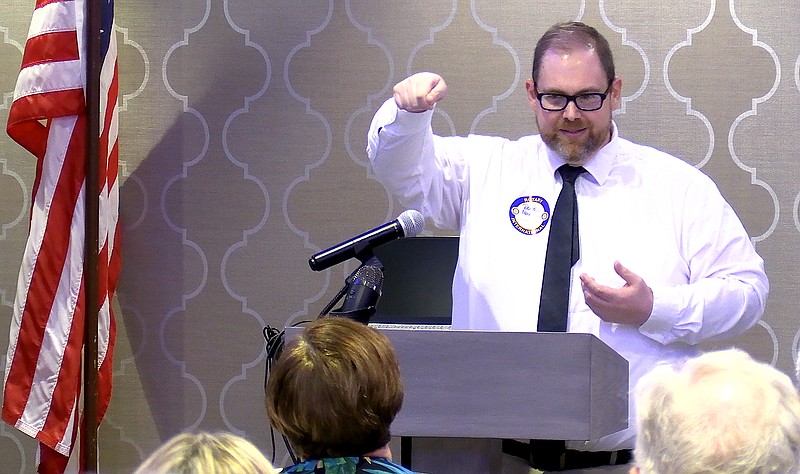As Arkansas schools continue to up their resources with regard to the strengthening of computer science skill sets of students, their technological future and potential is bright, Daniel Moix, Arkansas School for Mathematics, Sciences, and the Arts director of STEM Pathways and Coding Arkansas' Future, said Wednesday.
Under Gov. Asa Hutchinson's initiative, every school in the state is required to teach computer science, and beginning this fall, each school will be required to have their students graduate with computer science on their transcript.
"Your young people soon to be in the workforce will have this exposure and hopefully this will provide you the opportunity to be able to develop the next big thing," Moix said at the weekly Hot Springs National Park Rotary Club luncheon at the DoubleTree by Hilton Hot Springs. "That's what Coding Arkansas' Future is. That's a little bit about what computer science is, and I'm really excited to see what's going to happen."
Moix talked about his introduction to computer programming at the Arkansas School for Math and Science, as it was known during the late 1990s.
"Computer science is not just coding. Computer science is this abstract notion that is hard to pin down, but you can imagine what coding is. Coding, really, is just translating instructions into something that a machine can follow," he said.
He used the example of his recent dentist visit in which a dental assistant scanned a 3-dimensional model of his tooth using a "magic wand," and a little while later printed out a crown.
Video not playing? Click here https://www.youtube.com/embed/bnwhVp74Tdg
"It was just having a machine that we have taught to do a job or that we have programmed to do a job. Coding is the process of teaching these machines to do these things. You know, it costs a lot of money to lift something into outer space. And there are now missions that are going without the necessary tools to fix the vessels. But they are taking their 3D printing machines that have the plans to produce the tools," he said.
"So rather than have a whole toolbox, which is very heavy, and especially to launch into outer space, you have some filament and you have a machine and you print out the tool that you needed -- which is pretty neat -- and computing enables that," Moix said.
Though being taught by universities and colleges, at the time, ASMSA was one, if not the only, school that was teaching high school students to do that, he said.
"Where could we go if we had a workforce of young people who have never been lost (due to GPS-enabled smartphones), have 100% access to every bit of information known to man -- they just have to learn to be good citizens of the digital universe -- and have teachers who are empowered and identify as computer science teachers," he said. "That's something that we've never had, and Arkansas is ahead of the curve in providing that to students across the state."
Moix talked about how the governor's initiative first came about and why coding is so important.
"If you know this story, the governor's granddaughter, Ella Beth, was trying to help him with his campaign and she said, 'Well, let me make an app.' And she helped him by making an app. He was fascinated by the fact that his granddaughter could (do that). And, you know, our governor has a lot of perspective from a national scope on security and important things like that, and he saw how valuable the skill set of people who are, not just able to use computers, but who are able to develop solutions and solve problems through the use of computing," he said.
Explaining the difference between coding and computer science, he said there is "an awful lot of thinking" that has to happen between the problem and the solution.
"Coding, if we just take that as 'programming the steps into the machine,' coding is just teaching the machine to do the solution," he said. "Computer science involves a lot more human interaction and problem solving ... sort of like the difference between architecture and construction -- because the architect has to do the thought process to figure out 'how do I stand this thing up so that it will not fall down?' and then someone builds it based on the plans. So computer science has a lot more in it than just coding."
Noting the payoff of such technological savvy, he said, like so many things -- such as being able to find one's way when lost, or having a computer suggest the least expensive place to buy something, there is a lot of power in understanding how computing works.
"Whether you're buying software for your business or you're going on vacation -- the power of computing is immense, and the value that that brings is tremendous. And having the folks and the manpower to build those systems is really what coding and computer science is about," he said.
When ASMSA Director Corey Alderdice asked Moix to come back to ASMSA in 2015 to start the Coding Arkansas' Future program, there were still half a dozen to a dozen schools teaching computer science, he said, which is not enough to get a qualified workforce "out there to do all the good work that needs to be done."
With the exception of one, he said every single one of the Arkansas Computer Science Educator of the Year recipients has been a product of ASMSA.
"We are really happy to have empowered so many computer science teachers in the state and we do that by providing them with curriculum, we give them the lessons to teach, we provide them the support, we have office hours every week and if something goes sideways in the classroom, they can get hold of us," he said.
